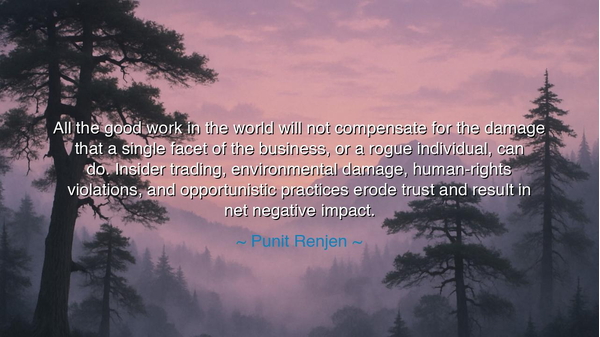
All the good work in the world will not compensate for the damage
All the good work in the world will not compensate for the damage that a single facet of the business, or a rogue individual, can do. Insider trading, environmental damage, human-rights violations, and opportunistic practices erode trust and result in net negative impact.






The words of Punit Renjen stand like a solemn bell tolling across the valleys of commerce and power: “All the good work in the world will not compensate for the damage that a single facet of the business, or a rogue individual, can do. Insider trading, environmental damage, human-rights violations, and opportunistic practices erode trust and result in net negative impact.” Here is a teaching that pierces the illusions of false glory. For many boast of their charities, their grand projects, their shining buildings, but beneath the surface of their empires may dwell corruption, deceit, and ruin. The wisdom of this quote is that trust once broken cannot be restored by ornament, and that even the smallest fracture in integrity may collapse the mightiest structure.
When Renjen speaks, he warns not against failure in achievement, but against rottenness at the core. A company may clothe itself in benevolence, yet if one corner hides insider trading, the edifice trembles. A corporation may proclaim its philanthropy, yet if it poisons rivers and lays waste to forests through environmental damage, its words become ash. A leader may raise monuments to his name, but if he enslaves workers or violates human rights, his monument crumbles into dust. For trust is not built by abundance of deeds, but by the purity of each deed.
History offers us countless witnesses to this truth. Consider the fall of Enron, once hailed as a titan of innovation and energy. The company poured resources into good works and community partnerships, yet its heart was corroded by deceit and fraudulent accounting. When the truth was revealed, all its good vanished like smoke, leaving only devastation for employees, investors, and the public. The mighty were brought low because they forgot that one lie can outweigh a thousand promises.
Contrast this with leaders who chose integrity even at great cost. Think of Abraham Lincoln, who during America’s darkest trial chose the harder road of emancipation. He might have compromised, offering half-measures for temporary peace, but he understood that the stain of slavery could not be balanced by progress in other spheres. A nation could not claim greatness while its very foundation was fractured by injustice. He chose righteousness, and though the war was bitter, his decision built a legacy that endured beyond his years.
The teaching here is both warning and beacon: a single act of dishonor can outweigh a multitude of honorable deeds. It is not enough to build schools while exploiting workers, nor to plant trees while destroying oceans. Good cannot be bartered against evil; integrity is not a ledger where one column cancels the other. As a single drop of poison renders a cup of water undrinkable, so too can a single act of corruption render all other works hollow.
What then shall we do? First, let each man and woman examine their own actions. Ask not only, “What good have I done?” but also, “What harm might my hand have caused?” For it is folly to boast of kindness while ignoring the wounds one has inflicted. Second, within businesses, communities, and nations, cultivate a culture where integrity is indivisible. Do not excuse the rogue act, do not hide the small corruption, for these are seeds of destruction. Shine light upon them, and uproot them, lest they spread like weeds across the field.
The practical path is this: leaders must ensure that their values are consistent in all things, and individuals must refuse to compromise conscience for profit or convenience. Build systems of accountability; speak truth even when silence would be easier. Remember that trust, once broken, may never return. Live in such a way that your smallest deed aligns with your greatest vision, and that no hidden rot can undermine your good works.
So let the lesson of Renjen’s words be carried forth: greatness is not measured by the abundance of one’s charities or the scale of one’s wealth, but by the wholeness of one’s integrity. Guard against the single flaw, the solitary betrayal, the hidden act of harm. For the world is not healed by masks of goodness, but by the undivided harmony of justice, compassion, and truth. Only then shall our works shine with a light that endures beyond the passing of ages.






AAdministratorAdministrator
Welcome, honored guests. Please leave a comment, we will respond soon